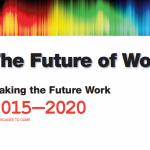 We’re still less than a third of the way through 2015 and already there have been a number of reports on the future of work.
We’re still less than a third of the way through 2015 and already there have been a number of reports on the future of work.
Recently we had the Fast Forward 2030: The Future of Work and the Workplace report from CBRE and Genesis, which was less about how work will look in 15 years time as what kind of workplace Millennials would love to have right now.
We then had New Ways of Working from the Virgin backed B Team, which looked at some of the things driving the change in our workplace.
We’ve even had the recent launch of the crowdsourced Workplace Conversation, which is a project supported by a number of UK professional bodies.
Or there was the recent paper from the Hamilton Project, which looked more broadly at the topic and explored some of the social impacts of the changing face of work.
Finally we had the Erik Brynjolfsson led work looking at the kind of skills (or mindset) required to survive the skills race against automation.
Getting from A to B
Of course, any exploration of ‘the future’ assumes that we aren’t there already, that there is a journey we need to go on to get to that (promised) place.
That was the focus of a recent paper from the folks at SimplerWork. They wanted to explore what it was that might help, or hinder, changes in the way we work.
They identified three core findings:
- The way we manage people is not equipped for the future of work. They gave a nod to John Husband’s wirearchy concept as a means of ‘freeing up people’. The main culprit for this intransigence is a reluctance to face the risks involved with such change, with leadership courage required to overcome this fear.
- Employee engagement is broken. We all know that though, right? The report suggests that half of the problem is that engagement is still primarily looked at from the employers perspective.
- Personal passions are key, which again, is nothing really new. The report does say however that an inner serenity and confidence in who we are is key to tackling the rapidly changing environment we find ourselves in.
Whilst the report was undoubtedly interesting, there is a strong sense with it that it’s preaching to the converted. It’s hard to really dispute any of the content in the report, but then I’m largely on board with all of this in the first place.
Is there enough in there to convince people that aren’t? Is there enough direction and support to help take a naysayer from their current state to a new and more ‘enlightened’ future?
That the paper is largely qualitatively derived doesn’t help matters, as it can make it easy to ask the “yeah, but…” questions as there is little really tangible evidence that this new future is infinitely better than the present.
I suppose that’s the challenge we face. I’ve no doubt that there are many people that ‘get’ this approach, and I’m sure they’ll find much in the report to agree with (or confirm what they believe). The challenge is in persuading those who don’t.
Time will tell how effective reports like this one, and those mentioned earlier in the post, are in doing that.
Have a read though and let me know your thoughts below.
Goodness, yet another report? Is it really necessary?
As you say, there's nothing here that is new to anyone that cares about the topic. Is it enough to convince those that don't? I'm not so sure.